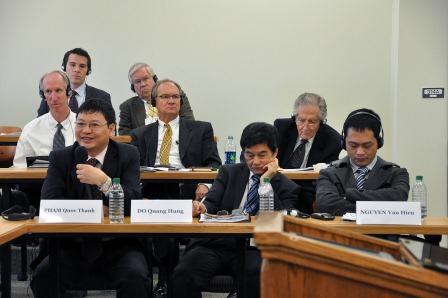





Ben Wishart, Research Advisor
DO Quang Hung, Professor, International Politics Department; Faculty of Political Science, University of Social Sciences and Humanities, Vietnam National University discussed how Vietnam is striving to create more effective religious laws. Vietnam is a secular state, but is going through a period of "religious reconfiguration."
New religious policy in Vietnam began on or around 1990 with a policy called, "Resolution 24." Under this resolution two ordinances have significantly changed how religion in Vietnam is viewed by the law. First, The Ordinance on Behalf of Religion was passed on June 18, 2004. It was prepared for over eleven years and then took another four years and twenty-two drafts to pass. This ordinance provides guidelines regarding the five qualifications to obtain official religious status as well as regulations on religious activity including property rights. The second ordinance that has had a significant effect on the religious freedom is the Directive of the Prime Minister Regarding Protestantism/Christianity, passed on February 4, 2005. Prior to this resolution there were only six officially recognized religions in Vietnam. Since then there are approximately thirty-four religions in various stages of official recognition.
NGUYEN the Hung, Program Officer, International and Humanitarian Affairs, Ministry of Public Safety discussed the police’s roll to enforce religious laws in Vietnam. He emphasized that past information regarding religious persecution in Vietnam were, "not accurate." PHAM Quoc Thanh, Vice Dean, Faculty of Political Science, University of Social Sciences and Humanities, Vietnam University discussed the his research regarding religion and cultural differences.
Professor DO Quang Hung said that there are still challenges with obtaining clarity in the law. For example, the laws with regard to proselytizing and property ownership are not well defined. However, he is optimistic that over the next two years there will be more clarity with regard to religious laws and that Vietnam will continue to develop more fair religious laws for its people.
